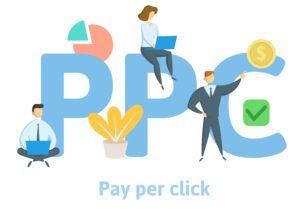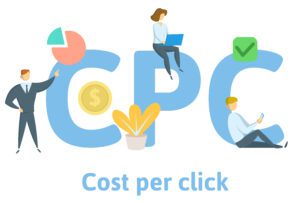Although at first glance PPC (pay per click) and CPC (cost per click) may seem like the same thing, there is actually an important distinction between the two terms which is important for marketers to understand in order to create and monitor successful ad campaigns.
Before we go into detail, a quick summary from our PPC Lead, George:
“CPC is cost-per-click an metric telling you the price you pay on average per click, as every single click is charged differently. PPC is the description of the industry, pay-per-click which covers multiple different ad inventories.”
PPC (pay per click)

This is an advertising method to draw traffic to a site where advertisers pay a certain amount each time a user clicks on their ad. The more clicks they receive the more payments they’ll make, but the cost of these clicks will decrease as they become more likely to lead to conversions, otherwise known as paying customers. Therefore the company gains a profit through the revenue earned from a customer paying for their products and services from their webpage.
This pricing model is popular amongst advertisers because you only pay when your ads are directly engaged with, unlike other strategies which may charge you monthly without guaranteeing impressions. Through keyword research and thorough data analysis, PPC allows you to target your ads to specific customers on the most profitable platforms in order to get the highest return on your investment.
You can see examples of PPC under the “Sponsored” results on Google’s SERP (search engine results page). As well as in list form, PPC results often show up in what’s known as the Shopping Carousel. For example, if you were to type something like “coffee beans Manchester” into Google, we can see that 200 Degrees, Kingdom Coffee, and Pure Gusto have likely paid to appear higher up in the results rankings.
PPC Advantages
There are many positive aspects of incorporating a competent PPC strategy into your business’s ad campaigns and customer engagement. Although there is always a cost involved with advertising, PPC makes it more likely that you’ll see direct results from your investments and have more control over how your budget is being used.
PPC is also a proven strategy for reaching both a wider, and more intentional audience. Because your ads can be displayed on the Google Display Network, you’re more likely to pop up for already-existing Google users, and with exclusions and audience targeting, you can tailor your ads to appeal to the right sort of customer.
CPC (Cost per Click)

If PPC is the method, then CPC is the financial metric used to measure the overall cost of each click on your advertisements. This allows you to assess the effectiveness of your adverts by showing you how much money is being spent compared to how much return on investment your campaign is bringing in.
By applying CPC to your PPC budget, you can set a maximum cost-per-click bid which indicates how much you’re willing to pay for a click. Your max CPC is the maximum you would be charged each time a user clicks on your ad, but often you’ll be charged less, what’s called the actual CPC. You can set these bidding metrics either manually so that you choose your bid amounts yourself, or automatically, which is when Google uses PPC Intelligence in order to achieve the maximum number of clicks out of your budget.
Google also has the option of Enhanced Manual CPC, where you can manually set your bids per keyword but Google cleverly adjusts your cost per click in order to help maximise conversions or conversion value by assessing variations in periods of ad interactions.
CPC can be calculated by dividing the total expenditure by the total number of clicks. For example, if your company sent £1,000 on PPC ads, and this generated 600 measured clicks, your CPC would stand at £1.6 each year.
CPC Advantages
One of the biggest advantages of CPC is how easy it is to calculate compared with how useful it is to understand how well your ads are performing based on how much you’re spending on each click – that’s what we called a good ROI. If you’re carrying out your PPC campaign on Google Ads, it couldn’t be easier to calculate your CPC as all of the information you need is on the Google Ads dashboard.
“Comparison is the the thief of joy”
Said Teddy Roosevelt, except when you’re devising a successful marketing strategy and ad campaign. Comparatively, PPC is the method whereas CPC is the metric used to analyse how well a company’s ads are performing. In order to make the most of one, you must have the other. CPC will help you maintain a close eye on your PPC expenditure and an even closer eye on the interests and intentions of any potential leads so that your company can thrive.
FAQs
Answered by Tom McGuigan
Is a lower cost per click the aim?
Only if performance is better because of it. Sometimes a higher CPC means that you’re appearing higher in the search results, which is obviously more desirable than not if the keyword is relevant.
How many advert spots are available on the SERP?
You’ll typically only ever see 3 at the top of the page and then more further to the bototm of the page. It does vary however depending on quality scores, CPC’s, and number of ads that are triggering for each search.
What are the other metrics used to measure success of PPC?
Conversions, conversion value, Return on ad spend, and Cost per lead are the most fundamental ones depending on the type of ads that you’re running.
Do I get charged for clicks which resulted in an immediate bounce?
Possibly. There is a thing called “invalid clicks” where Google can refund spend based on whether it deems that the click on the ad isn’t the result of genuine user interest.
Can CPC be used as an advertising strategy?
Only in that you can use certain bidding strategies that limit the Maximum CPC’s for each click that you get.












